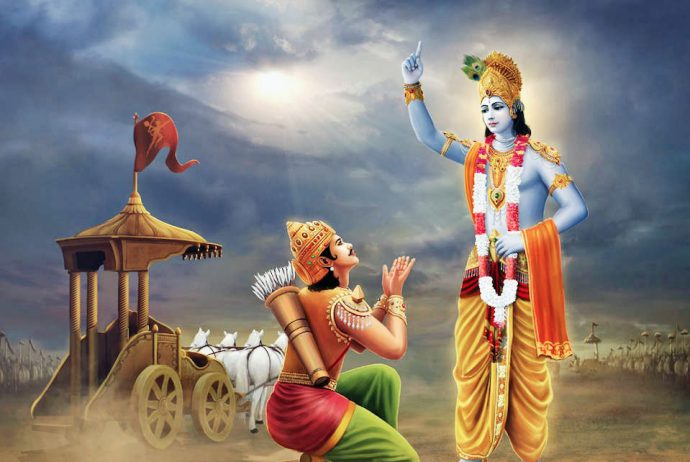
Author: Vasundhara


The Value of Book Learning
The Value of Book Learning
Once some very learned Sanskrit scholars were sitting in the old hall discussing portions of the Upanishads and other scriptural texts with Bhagavan.
Bhagavan was giving them proper explanations and it was a sight to remember and adore! At the same time, I felt genuinely in my heart, ‘Oh, how great these people are and how fortunate they are to be so learned and to have such deep understanding and be able to discuss with our Bhagavan. Compared with them, what am I, a zero in scriptural learning?’ I felt miserable.
After the pundits had taken leave Bhagavan turned to me and said, “What?”, looking into my eyes and studying my thoughts. Then, without even giving me an opportunity to explain, He continued, “This is only the husk! All this book learning and capacity to repeat the scriptures by memory is absolutely no use. To know the Truth, you need not undergo all this torture of learning. Not by reading do you get the Truth. BE QUIET, that is Truth, BE STILL, that is God”.
Then very graciously He turned to me again and there was an immediate change in his tone and attitude. He asked me, “Do you shave yourself?” Bewildered by this sudden change, I answered, trembling, that I did.
“Ah, for shaving you use a mirror, don’t you? You look into the mirror and then shave your face; you don’t shave the image in the mirror. Similarly all the scriptures are meant only to show you the way to realization. They are meant for practise and attainment. Mere book learning and discussions are comparable to a man shaving the image in the mirror”. From that day onwards the sense of inferiority that I had been feeling vanished once and for all.
Ramana Smrti
Author not specified

How am I to practise desirelessness – Nisargadatta
How am I to practise desirelessness – Nisargadatta
Questioner: How am I to practise desirelessness?
Maharaj: No need of practice. No need of any acts of renunciation. Just turn your mind away, that is all. Desire is merely the fixation of the mind on an idea. Get it out of its groove by denying it attention.
Q: That is all?
M: Yes, that is all. Whatever may be the desire or fear, don’t dwell upon it. Try and see for yourself. Here and there you may forget, it does not matter. Go back to your attempts till the brushing away of every desire and fear, of every reaction becomes automatic.
Q: How can one live without emotions?
M: You can have all the emotions you want, but beware of reactions, of induced emotion. Be entirely self-determined and ruled from within, not from without.
Merely giving up a thing to secure a better one is not true relinquishment. Give it up because you see its valuelessness. As you keep on giving up, you will find that you grow spontaneously in intelligence and power and inexhaustible love and joy.
Q: Why so much insistence on relinquishing all desires and fears? Are they not natural?
M: They are not. They are entirely mind-made. You have to give up everything to know that you need nothing, not even your body. Your needs are unreal and your efforts are meaningless. You imagine that your possessions protect you. In reality they make you vulnerable. Realize yourself as away from all that can be pointed at as ‘this’ or ‘that’. You are unreachable by any sensory experience or verbal construction. Turn away from them. Refuse to impersonate.
Q: After I have heard you, what am I to do?
M: Only hearing will not help you much. You must keep it in mind and ponder over it and try to understand the state of mind which makes me say what I say. I speak from truth; stretch your hand and take it. You are not what you think yourself to be, I assure you. The image you have of yourself is made up from memories and is purely accidental.
Nisargadatta Maharaj – I Am That
God is the End of All Desire and Knowledge
Item 70.

Guide to Family and Social Relationships – Buddha
Guide to Family and Social Relationships – Buddha
A young man named Sigala used to worship the six cardinal points of the heavens – east, south, west, north, nadir and zenith – in obeying and observing the last advice given him by his dying father. The Buddha told the young man that in the ‘noble discipline’ (ariyassa vinaye) of his teaching, the six directions were different. According to his ‘noble discipline’ the six directions were: east: parents; south; teachers; west: wife and children; north: friends, relatives and neighbours; nadir: servants, workers and employees; zenith: religious men.
‘One should worship these six directions’ said the Buddha. Here the word ‘worship’ (namasseyya) is very significant, for one worships something sacred, something worthy of honour and respect. These six family and social groups mentioned above are treated in Buddhism as sacred, worthy of respect and worship. But how is one to ‘worship’ them? The Buddha says that one could ‘worship’ them only by performing one’s duties towards them. These duties are explained in his discourse to Sigala.
First : Parents are sacred to their children. The Buddha says: ‘Parents are called Brahman'(Brahmati matapitaro). The term Brahman(Almighty God) denotes the highest and most sacred conception in Indian thought, and in it the Buddha includes parents. So in good Buddhist families at the present time children literally ‘worship’ their parents every day, morning and evening. They have to perform certain duties towards their parents according to the ‘noble discipline’: they should look after their parents in their old age; should do whatever they have to do on their behalf; should maintain the honour of the family and continue the family tradition; should protect the wealth earned by their parents; and perform their funeral rites after their death. Parents, in their turn, have certain responsibilities towards their children: they should keep their children away from evil courses : should engage them in good and profitable activities; should give them a good education ; should marry them into good families ; and should hand over the property to them in due course.
Second: The relation between teacher and pupil : a pupil should respect and be obedient to his teacher : should attend to his needs if any ; should study earnestly. And the teacher, in his turn, should train and shape his pupil properly ; should teach him well ; should introduce him to his friends ; and should try to procure him security or employment when his education is over.
Third : The relation between husband and wife : love between husband and wife is considered almost religious or sacred. It is called sadara-Brahmacariya ‘sacred family life’. Here, too, the significance of the term Brahman should be noted : the highest respect is given to this relationship. Wives and husbands should be faithful, respectful and devoted to each other, and they have certain duties towards each other : the husband should always honour his wife and never be wanting in respect to her ; he should love her and be faithful to her ; should secure her position and comfort ; and should please her by presenting her with clothing and jewellery. (The fact that the Buddha did not forget to mention even such a thing as the gifts a husband should make to his wife shows how understanding and sympathetic were his humane feelings towards ordinary human emotions.) The wife, in her turn, should supervise and look after household affairs ; should entertain guests, visitors, friends, relatives and employees ; should love and be faithful to her husband ; should protect his earnings ; should be clever and energetic in all activities.
Fourth : The relation between friends, relatives and neighbours : they should be hospitable and charitable to one another ; should speak pleasantly and agreeably ; should work for each other’s welfare ; should be on equal terms with one another ; should not quarrel among themselves ; should help each other in need ; and should not forsake each other in need ; and should not forsake each other in difficulty.
Fifth : The relation between master and servant : the master or the employer has several obligations towards his servant or his employee : work should be assigned according to ability and capacity ; adequate wages should be paid ; medical needs should be provided ; occasional donations or bonuses should be granted. The servant or employee, in his turn, should be diligent and not lazy ; honest and obedient and not cheat his master ; he should be earnest in his work.
Sixth : The relation between the religious (lit. recluses and brahmanas) and the laity : lay people should look after the material needs of the religious with love and respect ; the religious with a loving heart should impart knowledge and learning to the laity, and lead them along the good path away from evil.
We see then that the lay life, with its family and social relations, is included in the ‘noble discipline’, and is within the framework of the Buddhist way of life, as the Buddha envisaged it. So in the Samyutta-nikaya, one of the oldest Pali texts, Sakka, the king of the gods (devas), declares that he worships not only the monks who live a virtuous holy life, but also ‘lay disciples (upasaka) who perform meritorious deeds, who are virtuous, and maintain their families righteously‘.
What the Buddha Taught
Walpola Rahula

Sri Buddha Teachings
Sri Buddha Teachings

Do what you feel like doing – Nisargadatta
Do what you feel like doing – Nisargadatta
Sri Nisargadatta Maharaj
Q: I seem to have a clear idea of what needs be done, but I find myself getting tired and depressed and seeking human company and thus wasting time that should be given to solitude and meditation.
M: Do what you feel like doing. Don’t bully yourself. Violence will make you hard and rigid. Do not fight with what you take to be obstacles on your way. Just be interested in them, watch them, observe, enquire. Let anything happen — good or bad. But don’t let yourself be submerged by what happens.
I Am That
Awareness is Free
Item 48

Muslim visitors – Ramana
Muslim visitors
For the last few days a rule is in force by which the visitors are not allowed to enter the hall between 12 noon and 2-30 p.m. A few Muslim visitors came to the Asramam in the interval today. The attendant promptly told them that they should not disturb Sri Bhagavan’s rest at this hour. Sri Bhagavan quietly got down from the sofa and came out of the hall; He sat on the stone pavement adjoining the wall and asked the visitors also to sit close to Him. He went on reading a newspaper and also laid Himself on the stone. He was finally requested to go in.
Talks with Ramana Maharshi
2nd March, 1939
Talk 638.

Sri Sarada Devi Teachings
Sri Sarada Devi Teachings

Control of the Mind – Sarada Devi
Control of the Mind – Sarada Devi
Teachings of Sri Sarada Devi, the Holy Mother
Control of the Mind (Part 1)
1. “Everything depends on one’s mind. Nothing can be achieved without purity of mind. It is said, ‘The aspirant may have received the grace of the Guru, the Lord, and the Vaishnava; but he comes to grief without the grace of the ‘one’. That ‘one’ is the mind. The mind of the aspirant should be gracious to him.”
2. “My child, this mind is just like a wild elephant. It races with the wind. Therefore one should discriminate all the time. One should work hard for the realization of God.”1
3. Disciple: “I cannot concentrate my mind well during meditation. My mind is fickle and unsteady.”
Mother: “Don’t worry! Restlessness is the nature of the mind, as it is of the eyes and ears. Practise regularly. The Name of God is more powerful than the senses. Always think of the Master2, who is looking after you. Don’t be troubled about your lapses.”
4. “Whenever the mind goes after anything other than God, consider that as transient and surrender the mind at the sacred feet of the Lord.”
5. “The mind naturally tends towards evil deeds. It is lethargic in doing good works. Formerly I used to get up at 3 a.m. and sit up for meditation. One day I felt disinclined to do so on account of physical indisposition. That one day’s irregularity resulted in the upsetting of my routine for a number of days. That is why I say that perseverance and tenacity are necessary for success in all good work.”
6. Mother forbade a disciple to make pilgrimages without discrimination of time and company. Quoting from a song, she said, ” ‘Pilgrimage and excursion are causes of misery. Oh my mind, don’t be restless about them.’ You can attain more in your house, if you are really earnest.”
7. Regarding weakness of the mind, Holy Mother said to a disciple, “Child, this is the law of nature. Have you not noticed the full moon and the new moon? Likewise the mind is sometimes dominated by good, and sometimes by bad tendencies.
8. Disciple: “Mother, my mind becomes restless now and then. It craves for enjoyments. That frightens me.”
Mother: “Don’t be afraid. I tell you that in this Kali Yuga mental sin is no sin. Free your mind from all worries on this account. You need not be afraid.”
9. “Can anyone altogether destroy lust? A little of it remains as long as one has the body. But it can be subdued, as a snake can be subdued by charmed dust.
10. Disciple: “However I may try to remove evil thoughts, I do not succeed.”
Mother: “This is the result of what you have done in your past life. Can one get rid of it by force? Cultivate good company, try to be good, and in time you will succeed. Pray to the Master. I, too, am here.”
1 Here is a story told by Swami Purushothamananda (Ramakrishna Mission Ashrama, Belgaum, Karnataka) regarding the nature of the mind. A honeybee was drinking honey from a lotus flower. The evening came and the bee thought, “Why should I leave now? Let me stay in the flower for the night and I will fly off tomorrow morning when the flower opens up again.” As the evening progressed, the petals of the lotus flower closed. The bee was caught inside the flower. In the night, a group of wild elephants came to the pond and in their excitement and play, crushed the lotus plants and flowers. The lotus flower in which the honeybee was imprisoned was no exception and it is needless to say what happened to the honeybee – the flower never opened and the bee died inside the flower.
A moment of weakness on the part of the honeybee ended its life. Temptations are the nature of the mind. Only by conscious effort, one will be able to overcome such temptations and direct the mind towards God. Japa (continuous recitation of God’s names) and meditation help one to strengthen the mind and pull it away from its weak nature.
2 Sri Ramakrishna Paramahamsa

Bhagavad Gita Verses – Selected by Ramana
Bhagavad Gita Verses – Selected and Arranged by Sri Ramana Maharshi
Sri Ramana Maharshi often encouraged Devotees to study the Bhagavad Gita. These verses may not come from the chapters in their numerical order, but they have been arranged by Ramana in the order of significance according to Him.
Sanskrit Verses and English Meaning
Item 1 : Chapter 2 – Verse 1
Sanjaya Uvaacha:
Tam tathaa kripayaavishtam ashrupoornaakulekshanam;
Visheedantam idam vaakyam uvaacha madhusoodanah.
Sanjaya said:
To him who was thus overcome with pity and compassion,
and who was despondent with despair, and with eyes full
of tears and was agitated, Madhusudana
(the destroyer of Madhu), spoke these words.
Item 2 : Chapter 13 – Verse 1
Sri Bhagavaan Uvaacha: Idam shareeram kaunteya kshetramityabhidheeyate;
Etadyo vetti tam praahuh kshetrajna iti tadvidah.
The Lord said:
This body, Oh Kaunteya, is called the Field; one who knows it
is called the Knower of the Field by the sages who know.
Item 3 : Chapter 13 – Verse 2
Kshetrajnam chaapi maam viddhi sarvakshetreshu bhaarata;
Kshetrakshetrajnayor jnaanam yattat jnaanam matam mama.
Know Me also as the Knower of the Field in all fields, Oh Bharata!
Knowledge of both the Field and the Knower of the Field
is deemed by Me to be true knowledge.
Item 4 : Chapter 10 – Verse 20
Ahamaatmaa gudaakesha sarvabhootaashayasthitah;
Ahamaadishcha madhyam cha bhootaanaamanta eva cha.
I am the Self, Oh Gudakesha, seated in the Hearts of all beings!
I am the beginning, the middle and also the end of all beings.
Item 5 : Chapter 2 – Verse 27
Jaatasya hi dhruvo mrityur dhruvam janma mritasya cha;
Tasmaad aparihaarye’rthe na twam shochitum arhasi.
Certain is death for the born and certain is birth for the dead;
therefore, for what no one can prevent, you should not grieve.
Item 6 : Chapter 2 – Verse 20
Na jaayate mriyate vaa kadaachin
Naayam bhootwaa bhavitaa vaa na bhooyah;
Ajo nityah shaashwato’yam puraano
Na hanyate hanyamaane shareere.
Never is He born nor does He ever die; after having been,
He again ceases not to be. Unborn, eternal, changeless
and ancient, He is not killed when the body is killed.
Item 7 : Chapter 2 – Verse 24
Acchedyo’yam adaahyo’yam akledyo’shoshya eva cha;
Nityah sarvagatah sthaanur achalo’yam sanaatanah.
This Self cannot be cut, burnt, made wet nor dried up.
It is eternal, all-pervading, stable, ancient and immovable.
Item 8 : Chapter 2 – Verse 17
Avinaashi tu tad viddhi yena sarvam idam tatam;
Vinaasham avyayasyaasya na kashchit kartum arhati.
Know That to be indestructible, by whom all this is pervaded.
None can cause the destruction of That, the Imperishable.
Item 9 : Chapter 2 – Verse 16
Naasato vidyate bhaavo naabhaavo vidyate satah;
Ubhayorapi drishto’ntastwanayos tattwadarshibhih.
The unreal hath no being; there is no non-being of the Real;
the truth about both has been seen by the knowers of the Truth
(or the seers of the Reality).
Item 10 : Chapter 13 – Verse 33
Yathaa sarvagatam saukshmyaadaakaasham nopalipyate;
Sarvatraavasthito dehe tathaatmaa nopalipyate.
As the all-pervading ether is not tainted because of its subtlety,
so the Self seated everywhere in the body, is not tainted.
Item 11 : Chapter 15 – Verse 6
Na tadbhaasayate sooryo na shashaangko na paavakah;
Yadgatwaa na nivartante taddhaama paramam mama.
Neither the sun nor the moon nor fire illumines It;
and where having gone they return not; that is My Supreme Abode.
Item 12 : Chapter 8 – Verse 21
Avyakto’kshara ityuktastamaahuh paramaam gatim;
Yam praapya na nivartante taddhaama paramam mama.
What is called the Unmanifested and the Imperishable,
That they say is the highest goal (path). Those who reach It
do not return to this cycle of births and deaths.
That is My highest abode (place or state).
Item 13 : Chapter 15 – Verse 5
Nirmaanamohaa jitasangadoshaa Adhyaatmanityaa vinivrittakaamaah;
Dwandwairvimuktaah sukhaduhkhasamjnair Gacchantyamoodhaah padamavyayam tat.
Without pride, without delusion, victorious over the evil of attachment,
dwelling constantly in the Self, their desires completely abandoned,
freed from the pairs of opposites known as pleasure and pain,
the undeluded reach the eternal goal, the Immutable Abode.
Item 14 : Chapter 16 – Verse 23
Yah shaastravidhimutsrijya vartate kaamakaaratah;
Na sa siddhimavaapnoti na sukham na paraam gatim.
He who, casting aside the ordinances of the scriptures,
acts under the impulse of desire, attains neither perfection
nor happiness nor the supreme state.
Item 15 : Chapter 13 – Verse 28
Samam sarveshu bhooteshu tishthantam parameshwaram;
Vinashyatswavinashyantam yah pashyati sa pashyati.
He sees, who sees the Supreme Lord, existing equally
in all beings, the unperishing within the perishing.
Item 16 : Chapter 11 – Verse 54
Bhaktyaa twananyayaa shakyam aham evamvidho’rjuna;
Jnaatum drashtum cha tattwena praveshtum cha parantapa.
But by devotion alone, without the “otherness”,
can I be known in this form, and seen, and in reality
entered into, Oh Parantapa!
Item 17 : Chapter 17 – Verse 3
Sattwaanuroopaa sarvasya shraddhaa bhavati bhaarata;
Shraddhaamayo’yam purusho yo yacchraddhah sa eva sah.
The faith of each is in accordance with his nature, Oh Bharata!
The man consists of his faith; as a man’s faith is, so is he.
Item 18 : Chapter 4 – Verse 39
Shraddhaavaan labhate jnaanam tatparah samyatendriyah;
Jnaanam labdhvaa paraam shaantim achirenaadhigacchati.
The man who is full of faith, who is devoted to it,
and who has controlled all the senses gains knowledge;
and, having obtained the knowledge,
he swiftly attains Supreme Peace.
Item 19 : Chapter 10 – Verse 10
Teshaam satatayuktaanaam bhajataam preetipoorvakam;
Dadaami buddhiyogam tam yena maamupayaanti te.
To them who are ever steadfast, worshipping Me with love,
I give them the union with the intellect by which they come to Me.
Item 20 : Chapter 10 – Verse 11
Teshaam evaanukampaartham aham ajnaanajam tamah;
Naashayaamyaatmabhaavastho jnaanadeepena bhaaswataa.
Out of mere compassion for them, dwelling within their Self,
I destroy the darkness born of ignorance by the luminous lamp of knowledge.
Item 21 : Chapter 5 – Verse 16
Jnaanena tu tad ajnaanam yeshaam naashitam aatmanah;
Teshaam aadityavaj jnaanam prakaashayati tatparam.
But to those whose ignorance is destroyed by knowledge of the Self,
knowledge illumines the Supreme (Brahman) like the sun.
Item 22 : Chapter 3 – Verse 42
Indriyaani paraanyaahur indriyebhyah param manah;
Manasastu paraa buddhir yo buddheh paratastu sah.
They say that the senses are superior;
superior to the senses is the mind;
superior to the mind is the intellect;
and one who is superior even to the intellect
Is He, the Self.
Item 23 : Chapter 3 – Verse 43
Evam buddheh param buddhwaa samstabhyaatmaanam aatmanaa;
Jahi shatrum mahaabaaho kaamaroopam duraasadam.
Thus, knowing Him to be superior to the intellect
and restraining the self by the Self, Oh mighty-armed Arjuna,
slay the enemy in the form of desire, hard to conquer!
Item 24 : Chapter 4 – Verse 37
Yathaidhaamsi samiddho’gnir bhasmasaat kurute’rjuna;
Jnaanaagnih sarvakarmaani bhasmasaat kurute tathaa.
As the blazing fire reduces fuel to ashes, Oh Arjuna,
so does the fire of knowledge reduce all actions to ashes!
Item 25 : Chapter 4 – Verse 19
Yasya sarve samaarambhaah kaamasankalpa varjitaah;
Jnaanaagni dagdhakarmaanam tam aahuh panditam budhaah.
He whose undertakings are all devoid of desires
and selfish purposes, and whose actions have been burnt
by the fire of knowledge, Him the wise call a sage.
Item 26 : Chapter 5 – Verse 26
Kaamakrodhaviyuktaanaam yateenaam yatachetasaam;
Abhito brahma nirvaanam vartate viditaatmanaam.
Perfect Peace and Bliss radiates on all sides
for those self-controlled ascetics who are free
from desire and anger, who have controlled their
mind and who have realised the Real Self.
Item 27 : Chapter 6 – Verse 25
Shanaih shanairuparamed buddhyaa dhritigriheetayaa;
Aatmasamstham manah kritwaa na kinchidapi chintayet.
Little by little one should attain quietude and tranquillity
by the intellect held firmly; having made the mind establish
itself in the Self, let him not think of anything at all.
Item 28 : Chapter 6 – Verse 26
Yato yato nishcharati manashchanchalamasthiram;
Tatastato niyamyaitad aatmanyeva vasham nayet.
From whatever cause the restless, unsteady mind
wanders away, from that let him restrain it and
bring it under the control of the Self alone.
Item 29 : Chapter 5 – Verse 28
Yatendriya manobuddhir munir mokshaparaayanah;
Vigatecchaabhaya krodho yah sadaa mukta eva sah.
With the senses, the mind and the intellect always
controlled, having liberation as his supreme goal
one who devoutly seeks Liberation, free from desire,
fear and anger, that sage is certainly liberated for ever.
Item 30 : Chapter 6 – Verse 29
Sarvabhootasthamaatmaanam sarvabhootaani chaatmani;
Eekshate yogayuktaatmaa sarvatra samadarshanah.
With the mind harmonised by Yoga (union of the mind
with the Pure Self) he impartially sees the Self
abiding in all beings and all beings in the Self;
he sees the same everywhere.
Item 31 : Chapter 9 – Verse 22
Ananyaashchintayanto maam ye janaah paryupaasate;
Teshaam nityaabhiyuktaanaam yogakshemam vahaamyaham.
Those who worship Me and meditate on me alone, without
“otherness” thinking on me alone, ever united with me in mind,
I secure and protect their welfare.
Item 32 : Chapter 7 – Verse 17
Teshaam jnaanee nityayukta eka bhaktirvishishyate;
Priyo hi jnaanino’tyarthamaham sa cha mama priyah.
Of them, the wise Jnani, ever steadfast and devoted
to the One, excels (is the best); for, I am exceedingly
dear to the wise one and he is dear to Me.
Item 33 : Chapter 7 – Verse 19
Bahoonaam janmanaamante jnaanavaanmaam prapadyate;
Vaasudevah sarvamiti sa mahaatmaa sudurlabhah.
At the end of many births the wise Jnani finds refuge in Me,
realising that all this is Vasudeva (the innermost Self);
such a great soul (Mahatma) is very hard to find.
Item 34 : Chapter 2 – Verse 55
Prajahaati yadaa kaamaan sarvaan paartha manogataan;
Aatmanyevaatmanaa tushtah sthitaprajnastadochyate.
When a man completely casts off all the desires
of the mind, Oh Partha, and is satisfied in the Self
by the Self, then is he said to be one of steady wisdom.
Item 35 : Chapter 2 – Verse 71
Vihaaya kaamaan yah sarvaan pumaamshcharati nihsprihah;
Nirmamo nirahankaarah sa shaantim adhigacchati.
Abandoning all desires, one who moves about without
longing, without the sense of mine and without egoism,
He attains Peace of Mind.
Item 36 : Chapter 12 – Verse 15
Yasmaannodwijate loko lokaannodwijate cha yah;
Harshaamarshabhayodwegairmukto yah sa cha me priyah.
He by whom the world is not disturbed and who cannot
be disturbed by the world, and who is freed from excitement,
envy, fear and anxiety — he is dear to Me.
Item 37 : Chapter 14 – Verse 25
Maanaapamaanayostulyas tulyo mitraaripakshayoh;
Sarvaarambhaparityaagee gunaateetah sa uchyate.
The same in honour and dishonour, the same to friend and foe,
abandoning all egotistical undertakings – he is said to have
transcended the three Gunas.
Item 38 : Chapter 3 – Verse 17
Yastwaatmaratir eva syaad aatmatriptashcha maanavah;
Aatmanyeva cha santushtas tasya kaaryam na vidyate.
For one who rejoices and revels only in the Self,
who is satisfied in the Self alone, who is content
in the Self alone, for him really there is no work to do.
Item 39 : Chapter 3 – Verse 18
Naiva tasya kritenaartho naakriteneha kashchana;
Na chaasya sarvabhooteshu kashchidartha vyapaashrayah.
For him there is no interest or purpose whatsoever
in all the beings in what is done or what is not done;
nor does he depend on any being for any object.
Item 40 : Chapter 4 – Verse 22
Yadricchaalaabhasantushto dwandwaateeto vimatsarah;
Samah siddhaavasiddhau cha kritwaapi na nibadhyate.
Content with what comes to him without effort
by chance, having transcended the pairs of
opposites and envy, even-minded in success
and failure, though acting, he is not bound.
Item 41 : Chapter 18 – Verse 61
Eeshwarah sarvabhootaanaam hriddeshe’rjuna tishthati;
Bhraamayan sarvabhootaani yantraaroodhaani maayayaa.
The Lord dwells in the hearts of all beings, Oh Arjuna,
causing all beings, by His mysterious power,
to revolve as if mounted on a machine!
Item 42 : Chapter 18 – Verse 62
Tameva sharanam gaccha sarvabhaavena bhaarata;
Tatprasaadaatparaam shaantim sthaanam praapsyasi shaashwatam.
Surrender only to Him, Oh Bharata! Take refuge in Him
with all thy being. By His Grace you shall obtain
Supreme Peace and Eternal Abode.
Thus shines the quintessence of the Bhagavad Gita consisting of
the verses selected by Bhagavan Sri Ramana Maharshi. One who
studies these forty two verses with earnestness and devotion
easily attains the knowledge imparted by the complete Bhagavad Gita.

Momentum through Meditation – Eknath Easwaran

Momentum through Meditation – Eknath Easwaran
All the great traditions of mystics agree that to take to the spiritual life, it is not necessary to withdraw from society. We do not have to leave our family and community and retire to Mount Athos, or try to discover the harmony of nature in the jungles of a Micronesian island. For some, of course, the cloister is the right place; this is a matter of individual temperament and choice. But spiritual values can be lived anywhere: with our family, at work, wherever we are.
If you ask the person in the street about Saint Teresa of Avila or Saint Francis of Assisi, you will often get some comment like, “Visionary. Impractical. Could not keep their feet on the ground.” Because their inner life is so profound, we think that they have turned their backs on living. But one of the most practical reasons why the mystics turn their attention inward in meditation is to tap the power for solving problems that come up throughout the day.
This is very much like getting momentum in a track event. A few years ago, watching the Olympics on television, I was surprised to see how far back some of these athletes went to get a running start. In the pole vault one guy walked up to the bar, then turned around and strode so far back that I thought he had decided to go home. If you did not know about the pole vault you might think, “What is the matter with this fellow? Instead of competing, he is running away.” He is not running away; he is going back to get the momentum he needs for a really big jump.
That is the purpose of meditation too. Instead of getting out of bed and plunging directly into life’s maelstrom unprepared, you sit down for a half hour or so in meditation to get a good start. When you go out into the world, you have a good reserve of energy and security on which to draw, to be patient instead of angry, sympathetic instead of selfish, and loving instead of resentful.
One of my friends was warned by an acquaintance no to let meditation turn her into a zombie. I hear this from many people who are afraid they might lose their personality if they eliminate the sense of “I, me and mine” from their consciousness. I remind them that the word “personality” is related to the Latin word “persona”, a mask. In Alexander Dumas’ novel, the supposed twin brother of Lous XIV was forced to wear an iron mask for so many years that it became part of him. However hard he tried, he could not take it off to reveal his real face. All of us are like this. Through many years – or many lives – our minds have developed habits of selfishness and separateness through endless effortss to satisfy desires for personal pleasure and profit, power and prestige. If we can throw away this mask of separateness, our real personality, the Atman, shines forth in beauty, wisdom and love.
Down through the ages, mystics from all traditions have been telling us how to get this self-centered, little “I” out of the way to make room for the big “I”, our real Self, which is the source of joy. Unfortunately, most trends in our civilization are in the opposite direction: “Think about yourself always.” What they are really saying is, “Do not ever be happy.”
When my niece was with us in California several years ago, she had her heart set on being a hopscotch champion. It seemed to me that she was making good progress, but the subtleties of the game escaped me. So finally I asked her, “What is the secret of championship hopscotch?”
Her answer was right to the point: “Small feet.”
Even I could appreciate that. If you have constable’s feet, so long and broad that they cut across all the lines, you cannot get anywhere in hopscotch. Life is like that too: If you have a big ego, you cannot go anywhere without fouling on the lines. But there are people who have petite, size five egos, who find it easy to remember the needs of others. They may hot have much money or be highly educated, but they are loved wherever they go.
Sometime on the freeway I see an immense mobile home being pulled along by a truck. Warning flags stick out all over, and a big red sigh at the back warns, “Wide load”. Everybody knows what it means: “Watch out! I am not going to fit in my own lane, so I am going to take up some of yours too.”

Turn away from desire or fear – Nisargadatta
Turn away from desire or fear – Nisargadatta
Maharaj: You are back in India! Where have you been, what have you seen?
Questioner: I come from Switzerland. I stayed there with a remarkable man who claims to have realized. He has done many Yogas in his past and had many experiences that passed away. Now he claims no special abilities, nor knowledge; the only unusual thing about him is connected with sensations; he is unable to separate the seer from the seen. For instance, when he sees a car rushing at him, he does not know whether the car is rushing at him, or he at a car. He seems to be both at the same time, the seer and the seen. They become one. Whatever he sees, he sees himself. When I asked him some Vedantic questions he said: ‘I really cannot answer. I do not know. All I know is this strange identity with whatever I perceive. You know, I expected anything but this.’
He is on the whole a humble man; he makes no disciples and in no way puts himself on a pedestal. He is willing to talk about his strange condition, but that is all.
Maharaj: Now he knows what he knows. All else is over. At least he still talks. Soon he may cease talking.
Q: What will he do then?
M: Immobility and silence are not inactive. The flower fills the space with perfume, the candle — with light. They do nothing yet they change everything by their mere presence. You can photograph the candle, but not its light. You can know the man, his name and appearance, but not his influence. His very presence is action.
Q: Is it not natural to be active?
M: Everybody wants to be active, but where do his actions originate? There is no central point: each action begets another, meaninglessly and painfully, in endless succession. The alternation of work and pause is not there. First find the immutable centre where all movement takes birth. Just like a wheel turns round an axle, so must you be always at the axle in the centre and not whirling at the periphery.
Q: How do I go about it in practice?
M: Whenever a thought or emotion of desire or fear comes to your mind, just turn away from it.
Q: By suppressing my thoughts and feelings I shall provoke a reaction.
M: I am not talking of suppression. Just refuse attention.
Q: Must I not use effort to arrest the movements of the mind?
M: It has nothing to do with effort. Just turn away, look between the thoughts, rather than at the thoughts. When you happen to walk in a crowd, you do not fight every man you meet — you just find your way between.
Q: If I use my will to control the mind, it only strengthens the ego.
M: Of course. When you fight, you invite a fight. But when you do not resist, you meet with no resistance. When you refuse to play the game, you are out of it.
Q: How long will it take me to get free of the mind?
M: It may take a thousand years, but really no time is required. All you need is to be in dead earnest. Here the will is the deed. If you are sincere, you have it. After all, it is a matter of attitude. Nothing stops you from being a gnani here and now, except fear. You are afraid of being impersonal, of impersonal being. It is all quite simple. Turn away from your desires and fears and from the thoughts they create and you are at once in your natural state.
Q: No question of reconditioning, changing, or eliminating the mind?
M: Absolutely none. Leave your mind alone, that is all. Don’t go along with it. After all, there is no such thing as mind apart from thoughts which come and go obeying their own laws, not yours. They dominate you only because you are interested in them. It is exactly as Christ said ‘Resist not evil’. By resisting evil you merely strengthen it.
Q: Yes, I see now. All I have to do is to deny existence to evil. Then it fades away. But does it not boil down to some kind of auto-suggestion?
M: The auto-suggestion is in full swing now, when you think yourself to be a person, caught between good and evil. What I am asking you to do is to put an end to it, to wake up and see things as they are.
About your stay in Switzerland with that strange friend of yours: what did you gain in his company?
Q: Nothing absolutely. His experience did not affect me at all. One thing I have understood: there is nothing to search for. Wherever I may go, nothing waits for me at the end of the journey. Discovery is not the result of transportation.
M: Yes, you are quite apart from anything that can be gained or lost.
Nisargatta Maharaj – I Am That
What is Pure, Unalloyed, Unattached is Real
Item 72
